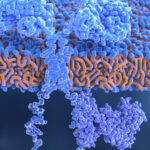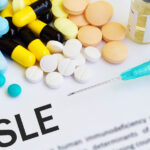Mixed news is not good news for baricitinib in two phase III studies in the Lancet.
The full data from parallel phase III trials of baricitinib for treating lupus have now been published in the Lancet, and it’s “back to the drawing board” according to Professor Eric Morand.
As reported previously, disappointing top-line efficacy results from the SLE-BRAVE-I and SLE-BRAVE-II trials led Lilly and partner Incyte to discontinue the phase III development program of baricitinib as a treatment for systemic lupus erythematosus.
The international multicentre double-blind trials each included over 750 patients with moderate to severe SLE on background therapy, including glucocorticoids. Patients were randomised 1:1:1 to receive either 4mg of baricitinib, 2mg of baricitinib or placebo, in addition to standard of care. The primary outcome was SLE Responder Index (SRI)-4 response at 52 weeks.
In the BRAVE-I study, 57% of participants in the 4mg baricitinib group achieved the SRI-4 response, significantly more than the placebo group (46%). The 2mg baricitinib group response, where 50% reached SRI-4, was not significantly greater than placebo. There were no significant differences among the groups on the major secondary outcomes including glucocorticoid tapering and time to first severe flare.
The positive primary efficacy outcome results were not replicated in the BRAVE-II study, where 47% of the 4mg group, 46% of the 2mg group and 46% of the placebo group reached SRI-4. Nor were the major secondary endpoints met.
There were no new safety signals reported, which was a positive in a patient group that has higher background immunosuppression and a greater thrombosis risk than other patient groups in which baricitinib has been investigated.
However, despite the positive findings of BRAVE-I, “negative secondary outcomes and negative results of [BRAVE-II] render interpretation of the effectiveness of baricitinib in SLE inconclusive”, wrote the authors, adding that “the findings overall do not support the use of baricitinib in SLE.”
In a Comment on the two papers, Dr Laura Durcan and Dr Grainne Murphy pointed to the complexity of lupus trials, given that it’s a “clinically and serologically heterogenous disorder with multiple domains of potential activity and response”.
They also mentioned that not all successful therapies achieved SRI-4 response in trials, using anifrolumab as an example: it didn’t meet SRI-4 in TULIP-1 but met the British Isles Lupus Assessment Group-based Composite Lupus Assessment response in TULIP-2.
Another difficulty facing SLE trials is that patients are on high levels of background immunosuppression, especially glucocorticoids, may lead to high placebo response rates, noted Dr Durcan and Dr Murphy.
Professor Eric Morand of Monash University was involved with both BRAVE studies and was first author on BRAVE-I. He said in a press release, “In many ways, this has sent us back to the drawing board, but all results help us know where to go from here.”
“We are determined to find effective treatments for all autoimmune diseases, including SLE, because people who have these diseases experience significant challenges to quality of life, and in many cases, shortened life expectancy. It is not acceptable,” said Professor Morand.
Professor Morand recently reported promising results from a phase II trial of TYK2 inhibitor deucravacitinib, and phase III trials are planned.
Baricitinib for #lupus – two ph3 trials, one positive & one not…no conclusive weight of evidence favoring a path to registration. So much work ahead…but even negative studies inform. Thanks @TheLancet for publishing both, so we can learn.
— Eric Morand ?? (@EricFMorand) February 25, 2023
https://t.co/zxwFPhklVU





